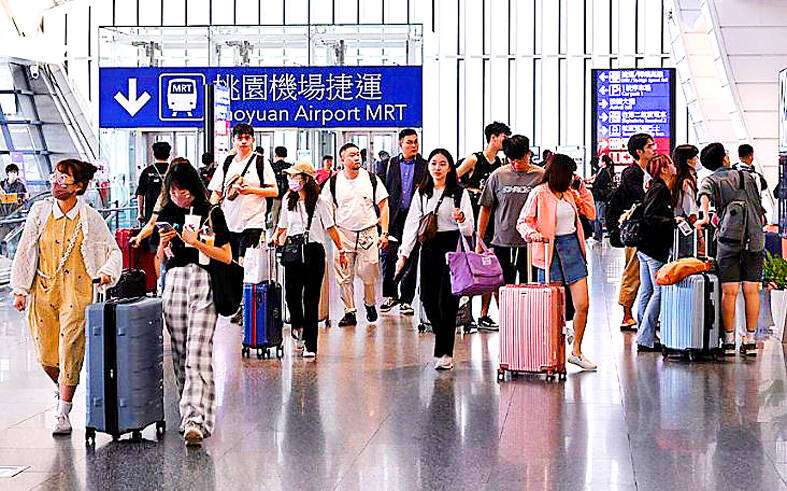Taiwan is soon to reopen its border to Chinese tourists coming from a third country as the government comes under pressure to break the impasse between Taipei and Beijing that has crippled cross-strait tourism, Premier Chen Chien-jen (陳建仁) said on Friday.
The idea to allow Chinese tourists traveling from a third place outside China has been under discussion within the government for quite a while, and details on how to implement the new policy would be announced soon, Chen said on Facebook on Friday evening.
Chen’s post came one day after business groups and local travel operators voiced their frustration at the impasse in cross-strait travel that began in 2016.

Photo: Liu Hsin-de, Taipei Times
Beijing has maintained its ban on group tours coming to Taiwan even after it announced on Thursday that it has added another 78 countries to the list of destinations where Chinese tourists are allowed to go on group tours after it loosened its COVID-19 travel restrictions in January.
Hsu Shu-po (許舒博), General Chamber of Commerce president on Thursday said that the government should step up efforts to end the stalemate in cross-strait relations.
Meanwhile, local travel agencies on the same day called on the government to extend an olive branch to Beijing by removing the ban on Taiwanese tour groups visiting China, a suggestion they have made multiple times before.
A source in the travel business, who asked to remain anonymous, on Thursday said that travel operators might take to the streets to make their voices heard if the government continues to remain unresponsive to their appeal.
The government initially responded to the exclusion of Taiwan on China’s list of 138 destinations for outbound group tours by repeating calls for Beijing to scrap the ban against the nation.
The government has urged China to open talks with Taiwan on resuming travel between the two sides on the basis of equality and reciprocity, to restore cross-strait exchanges in a healthy and orderly manner after the COVID-19 pandemic.
The government had expressed a wish to Beijing, before China’s announcement on Thursday, that both sides simultaneously lift their respective bans on tourists, but Beijing has yet to respond, officials said.
Since President Tsai Ing-wen (蔡英文) took office in May 2016, the country has seen a sharp decline in the number of Chinese tourists as a result of China gradually tightening its control and management of tourists to Taiwan, because Tsai refuses to endorse the notion of “one China.”
Beijing has banned Chinese tourists from traveling independently to Taiwan since Aug. 1, 2019, citing “current cross-strait relations,” and banned group travel in January 2020 at the beginning of the COVID-19 pandemic.
China’s ban also includes applicants to Taiwanese universities.
Taiwan allows individuals to go to China for travel or study.
However, Taiwan has maintained its ban on travel agencies organizing group travel to China, which was part of its COVID-19 control measures, and has not reopened its borders to Chinese tourists.

The Chinese military has built landing bridge ships designed to expand its amphibious options for a potential assault on Taiwan, but their combat effectiveness is limited due to their high vulnerability, a defense expert said in an analysis published on Monday. Shen Ming-shih (沈明室), a research fellow at the Institute for National Defense and Security Research, said that the deployment of such vessels as part of the Chinese People’s Liberation Army (PLA) Navy’s East Sea Fleet signals a strong focus on Taiwan. However, the ships are highly vulnerable to precision strikes, which means they could be destroyed before they achieve their intended

The Taiwan Experience Education Program (TEEP) has funded short-term internships in Taiwan for more than 4,500 young people from more than 40 countries since 2015, with the goal of attracting and retaining international talent, the Ministry of Education said yesterday. Fifty-five colleges launched 514 projects this year, including in fields such as semiconductors, artificial intelligence, medicine and biotechnology, green energy, and sustainability, it said. The program provides research and practical internships in Taiwan for two to six months, and offers cultural exchange and networking opportunities, the ministry said. For example, National Formosa University’s Embedded System and Autopilot Laboratory developed two solar-powered drones in

GLOBAL: Although Matsu has limited capacity for large numbers of domestic tourists, it would be a great high-end destination for international travelers, an official said Lienchiang County’s (Matsu) unique landscape and Cold War history give it great potential to be marketed as a destination for international travelers, Tourism Administration Director General Chen Yu-hsiu (陳玉秀) said at the weekend. Tourism officials traveled to the outlying island for the Matsu Biennial, an art festival that started on Friday to celebrate Matsu’s culture, history and landscape. Travelers to Matsu, which lies about 190km northwest of Taipei, must fly or take the state-run New Taima passenger ship. However, flights are often canceled during fog season from April to June. Chen spoke about her vision to promote Matsu as a tourist attraction in

Taipei resident Mu Chu-hua caught some glimpses of China’s mighty military parade on YouTube on Wednesday. As she watched hypersonic missiles roll down Beijing’s Changan Avenue and troops march in lockstep, she did not feel like they posed a threat to Taiwan. Mu, a 69-year-old retiree, said she saw the parade as simply a way for Chinese President Xi Jinping (習近平) to “say thank you to the troops.” “I thought it was quite normal,” she said. “It was very cool.” China’s military parade commemorating the end of World War II was being watched internationally for insights into Beijing’s military advances and its show